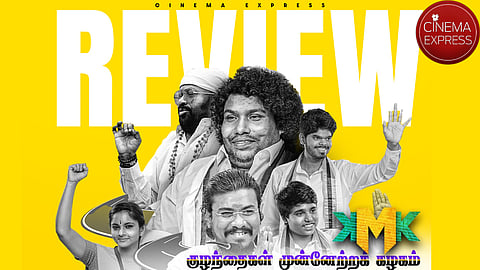Kuzhanthaigal Munnetra Kazhagam Movie Review: An amateurish, aimless film sans well-developed characters
Kuzhanthaigal Munnetra Kazhagam(1.5 / 5)
The late director Shankar Dayal’s Kuzhanthaigal Munnetra Kazhagam is a political film without any proper focus or sense of closure. It has a multitude of characters yet does not delve deep enough into any of their stories or arcs. There is a rivalry between a Mayor candidate named Aathimoolam (Yogi Babu) and his opponent Chanakya (Subbu Panchu) and the latter’s lover (Lizzie Antony). There is also stiff competition between Aathimoolam’s legitimate and illegitimate sons in school politics. The film often digresses into supporting characters and offers some vital information about them, only to draw some substandard humour in the process. In fact, everything the film dishes out in the name of comedy is quite juvenile, to say the least.
Kuzhanthaigal Munnetra Kazhagam devotes most of the screen time to the titular kids. Aathimoolam’s legitimate son Pallavan has a leadership role and much influence in his public school. He becomes friends with Alexander, knowing that the latter is his father’s son through an illegitimate relationship. Each of them wants the other to eventually work under his party while he becomes the Chief Minister of Tamil Nadu. However, the film does not show what exactly these children do to outwit the other in school politics. Whatever little they do comes across as mere mischief. There is plenty of dialogue about them wanting to outsmart each other, but we do not get the same in action. It is a major weakness causing a sense of abruptness from which the film does not recover.
Obviously, these elections are to teach students the importance of the democratic process and civic engagement. They can learn about campaigning, voting, and the importance of participation in government. But then Senthil shows up for an event at the school and delivers a lecture about the importance of school-level politics, equating it with sex education. It is like the film does not trust the audience to understand its main talking point.
Parallelly, there is the track involving Yogi Babu’s Aathimoolam and Subbu Panchu’s Chanakya. Here, too, there is much discourse about how Chanakya wants to beat Aathimoolam and become the Mayor, but there is little action substantiating the same. As a result, you always get a sense of incompleteness from Kuzhanthaigal Munnetra Kazhagam. Progress is only in the title of the film but not in action.
The film also dedicates much screen time to show how Pallavan arm-twists his school principal (Chitra Lakshmanan) to gain an unfair advantage in school politics or unethically cement a leadership position within his mates. Even when he makes a major decision about his candidacy in student pupil leader election, he does it with an eye on exploiting his rival by forming a warm relationship with her. In contrast, Alexander does not do any of the above. He is the more straightforward and honest child of the two. When the film uses a bizarre jump cut and shows where each of them eventually reaches in the nation’s political scene as adults, presumably the message of Shankar Dayal is about what between ethics and the lack of it works best in the field. The idea is reasonably interesting, but the execution is extremely underdeveloped and underwhelming.
As a result, there is always a sense of amateurishness in Kuzhanthaigal Munnetra Kazhagam. Just because it is a film about school politics, does not mean that it must dumb itself down. Unfortunately, there is little in the performances to redeem the film. Yogi Babu and Senthil have mere one-note roles, with the latter playing more of an extended cameo. The kids do a decent job of playing characters with some arcs of their own, but their portions go on for too long, depriving the film of any momentum.

